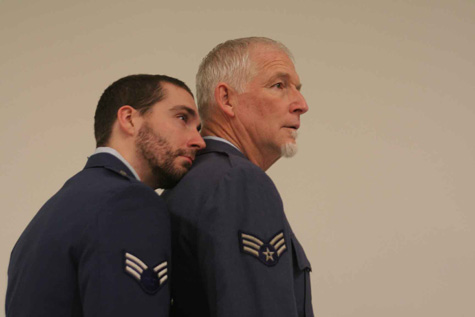
HOLIDAY MIRACLE Andrew Sawyer and Chris Newcomb. |
I have nothing against A Christmas Carol, but there's a lot of it out there right about now. I could easily fill my entire month's reviewing schedule with area Christmas Carols, and still leave some unseen. And so I usually gravitate, come Yuletide, to deviations. This year I found my way to Christmas: Naughty and Nice, an evening of short plays written by Daniel Curzon, which runs for one more Tuesday night. The five shorts of Naughty and Nice are produced by the Dark Water Theatre Company, which existed in these parts back in the '90s, has recently regrouped, and makes its temporary home in the Old Port Playhouse (a separate producing entity, which happens to be staging its own Christmas Carol Thursday through Sunday, through the 20th). Jeff Wax and Caleb Wilson direct.
Playwright Curzon won the 1999 National New Play Contest for Godot Arrives, and is a writer whose work frequently deals with gay-rights themes. He explains that he wrote Naughty and Nice "to vent his inner Grinch, to make angels weep, and because he has sold his soul to the Devil." That gives you a fair indication of the range of tones expressed over the course of the show's five plays.
At one end, we have the humor of precocious adolescents: In the opening play, "Honest Christmas Presents," which family members give what they really want to give, with varying degrees of cleverness: Tween Melissa in headgear (Andrew Sawyer) gets dog doo from her brother Billy (Wilson); Mom (Leslie Trentalange) gets a "pile remover" from Dad (Chris Newcomb), who in return gets a penis enlarger.
More puerile giddiness comes in a rangy Monty Pythonesque work-in-progress "The Christmas to End All Christmases," which follows up on a Scrooge-like character (Michael Tobin) post-epiphany (often quite funny, though it could use a narrowed focus); and "Nuns and Buns," in which two sisters (Wilson and Trentalange), one in drag, pelt each other with dinner rolls in the escalation of a debate over con- versus transubstantiation. Though the food-fighting quickly feels a little gratuitous, the nuns' argument has a few good verbal zingers, and their slow-mo fight scene is wittily staged.
At the far end of the show's range, we have the drama "A Christmas Mistake." The heartstring-pulling "Mistake" looks in on a man (Jeff Wax) remembering a past Christmas Eve, when he crossed the Golden Gate Bridge with his young daughter (Trentalange). The mistake of the title happens when the girl, who is fated to die the next year, believes a homeless man, who is about to jump (Newcomb), to be Santa Claus. The pathos and redemption are rather sentimental fare, but the scene receives some interesting staging: As Wax narrates, the three people in the encounter do not, for much of the story, look at each other — in fact, when the girl speaks to the homeless man, we see her look in the opposite direction from where Newcomb is perched over a railing. This creates the sort of split-screen effect that memory often takes, and it is eerily satisfying when gazes finally meet.